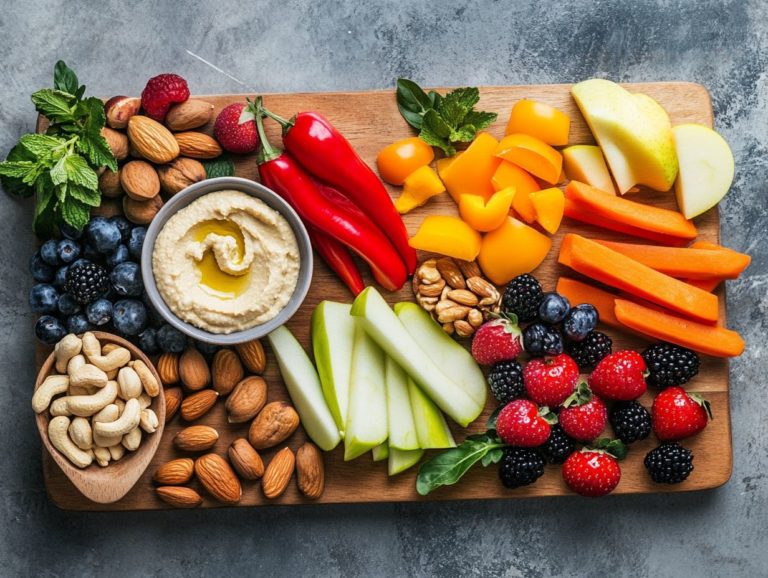Incorporating Mindfulness into Your Eating Habits
Mindfulness transcends mere trendiness; it’s a transformative approach that can significantly enhance various aspects of your life, especially your relationship with food.
This article delves into the essence of mindfulness and its compelling connection to your eating habits. Discover how embracing mindful eating can elevate your health, improve digestion, and assist in weight management.
You ll find practical tips for weaving mindfulness into your meals, overcome challenges, and uncover the profound benefits that arise from being present at the table.
Start now to transform your dining experience!
Contents
- Key Takeaways:
- What is Mindfulness?
- The Connection Between Mindfulness and Eating Habits
- Practical Tips for Incorporating Mindfulness into Eating Habits
- Benefits of Mindful Eating
- Challenges and Solutions for Maintaining Mindful Eating Habits
- Frequently Asked Questions
- 1. How can incorporating mindfulness into my eating habits benefit my health?
- 2. What are some practical ways to incorporate mindfulness into my eating habits?
- 3. Can incorporating mindfulness into my eating habits help with weight management?
- 4. Are there any recommended resources or tools for incorporating mindfulness into my eating habits?
- 5. How can incorporating mindfulness into my eating habits improve my overall well-being?
- 6. Is it possible to incorporate mindfulness into my eating habits even with a busy schedule?
Key Takeaways:

Mindful eating involves being present and aware while consuming food.
Incorporating mindfulness into eating habits can improve overall health by promoting better digestion and weight management, while reducing stress and emotional eating.
To practice mindful eating, try mindful meal preparation, slow and intentional eating, and listening to your body’s signals. It may take effort to maintain these habits, but the benefits make it worth it.
What is Mindfulness?
Mindfulness means paying full attention to what s happening, both inside and outside of you. It invites you to develop awareness of your thoughts and feelings in the present moment.
Originating from Zen Buddhism, this approach encourages you to observe your thoughts and feelings without judgment. This fosters a deeper understanding of your personal experiences.
Influential figures like Jon Kabat-Zinn have popularized mindfulness by introducing meditation techniques through programs such as Full Catastrophe Living. These aim to reduce stress and enhance emotional well-being.
Embracing this powerful practice can enrich various facets of your life, including emotional resilience and overall health.
Defining the Concept
Mindfulness is the art of maintaining moment-by-moment awareness of your thoughts, feelings, bodily sensations, and the environment around you. By fully engaging with the present, you can understand your emotions and reactions more deeply.
This means consciously focusing on your internal cues like physical sensations, emotional responses, and thoughts while observing them without judgment. Non-judgmental observation allows you to embrace your experiences, fostering self-acceptance and nurturing emotional stability.
This practice helps you let go of criticism and comparisons, creating space for a more compassionate relationship with yourself. Ultimately, mindfulness equips you with invaluable tools for managing stress and enhancing your overall well-being.
The Connection Between Mindfulness and Eating Habits
The connection between mindfulness and eating habits is significant, as mindful eating invites you to cultivate heightened awareness of your food choices.
By savoring each bite and tuning in to your internal hunger cues, you foster a healthier relationship with food. This practice effectively addresses unhealthy patterns often associated with emotional eating.
When you embrace mindful eating, you learn to appreciate your meals on a deeper level, paving the way for more intentional eating behaviors. This transformation enhances your weight management efforts and enriches your overall dietary habits and lifestyle.
How Mindful Eating Can Improve Health
Mindful eating can dramatically enhance your health by fostering better weight management, curbing emotional eating, and easing digestion issues.
When you embrace this practice, you slow down and truly pay attention to your eating habits. This cultivates a deeper connection with the food you consume and transforms your dining experience into something far more satisfying.
Research indicates that individuals who adopt mindful eating techniques often report a significantly improved relationship with food, along with noticeable enhancements in their digestive health. For example, a systematic review published in the journal ‘Appetite’ established a consistent link between mindfulness and a reduction in binge eating behaviors.
Those who practice mindful eating frequently experience lower anxiety levels regarding food choices. This paves the way for healthier decisions and supports obesity prevention.
Start practicing mindful eating today and feel the difference!
Practical Tips for Incorporating Mindfulness into Eating Habits

Incorporating mindfulness into your eating habits can be easy. Embrace practical strategies such as mindful meal preparation, intentional eating, and exploring the art of mindful eating to create a kitchen environment that encourages healthy choices.
Doing this helps you build a better relationship with your food and enhances your overall dining experience.
Mindful Meal Preparation
Mindful meal preparation invites you to engage in the cooking process. This starts with thoughtfully selecting ingredients and savoring the delightful aromas in your kitchen. Such engagement deepens your connection to the food you prepare and fosters gratitude for the nourishment it offers.
To begin, choose fresh, seasonal ingredients from local markets. This not only supports community farmers but also provides a vibrant array of flavors for your dishes.
While cooking, take your time. Chop vegetables with intention and stir sauces with care. This mindfulness allows you to appreciate the textures and scents, enriching your entire sensory experience.
This deliberate approach nurtures healthier eating habits and paves the way for lifestyle changes that foster a more balanced relationship with nutrition and well-being.
Slow and Intentional Eating
Slow and intentional eating encourages you to savor your food. This allows you to fully enjoy its sensory delights during each meal. Minimize distractions like phones and television to create a serene atmosphere that enhances mindfulness.
This focused approach helps you appreciate the textures and flavors of your food whether it s the satisfying crunch of fresh vegetables or the rich creaminess of a well-prepared dish.
Take smaller bites and chew thoroughly! This not only aids digestion but enriches your overall dining experience.
Engaging all your senses from the vibrant colors on your plate to the enticing aromas in the air transforms eating from a hurried obligation into a rewarding ritual. This fosters a deeper connection to your food.
Listening to Your Body’s Signals
Listening to your body’s signals, including hunger and fullness cues, is vital for developing healthier eating patterns and embracing self-acceptance.
Tune into these natural indicators. This helps you build a better relationship with your body and fosters emotional resilience against societal pressures surrounding food and appearance.
Mindful eating encourages you to recognize genuine hunger and distinguish it from emotional cravings, which often lead to mindless snacking.
Acknowledging these cues enables you to make choices that meet your true needs and nurtures self-compassion.
Practicing this can significantly improve your relationship with food, leading to a more balanced and fulfilling lifestyle.
Benefits of Mindful Eating
The advantages of mindful eating are remarkable!
You can experience enhanced digestion, effective weight management, and significantly lower stress levels often tied to emotional eating.
Embracing this practice nourishes your body and fosters a deeper connection with your food and well-being.
Improved Digestion and Weight Management

Mindful eating enhances digestion and supports effective weight management by promoting healthier eating habits and increasing awareness of food choices.
This method invites you to slow down during meals, savor each bite, and tune into your body s hunger and fullness cues.
By fostering a deeper connection with food, you’ll appreciate the flavors and textures more, leading to satisfying meals. As a result, you may consume fewer calories and make more nutritious selections.
Over time, the positive impact on your digestion becomes clear. You ll experience fewer digestive issues, and your body will function more efficiently.
When you practice these mindful habits regularly, they aid in weight control and contribute to an overall sense of well-being in your daily life.
Start implementing these mindful eating practices today for a healthier and more enjoyable relationship with food!
Reduced Stress and Emotional Eating
Mindful eating can significantly reduce stress and alleviate emotional eating by cultivating a practice of mindfulness that promotes awareness without judgment and encourages meaningful behavioral change.
This approach enables you to forge a deeper connection with your body and emotions, helping you recognize and respond to cravings in a more constructive manner.
Techniques such as deep breathing, savoring each bite, and reflecting on your feelings before reaching for food can truly transform your relationship with eating.
By emphasizing awareness and self-compassion, you can develop healthier emotional responses, enabling you to tackle life’s challenges without turning to food for comfort.
Incorporating practices like meditation and journaling can further enrich this journey, helping you feel balanced and enhancing your emotional well-being.
Challenges and Solutions for Maintaining Mindful Eating Habits
Maintaining mindful eating habits can indeed be challenging, as negative behaviors and distractions frequently arise.
Committing to practice and joining supportive groups can help you overcome these challenges.
Overcoming Common Obstacles
Overcoming common obstacles to mindful eating requires a proactive approach to tackling unhealthy habits and fostering meaningful behavior change.
You may find yourself grappling with distractions like smartphones and televisions, leading to mindless eating and making you overlook important cues from your body.
To counter this, consider creating a designated eating area that is free from screens. This simple shift can significantly enhance your focus on the food and its flavors.
Emotional triggers, such as stress or boredom, often nudge you toward unhealthy snacks. Build your emotional resilience with tools like journaling or short, refreshing walks. You can effectively redirect these impulses.
Recognizing these challenges and implementing targeted strategies will enable you to gradually cultivate a more mindful relationship with food.
Creating a Sustainable Mindful Eating Practice
Creating a sustainable mindful eating practice requires you to delve into your personal motivations and commit to a regular routine.
This journey begins with uncovering the deeper reasons behind your desire to eat mindfully whether it s to enhance your health, cultivate a better relationship with food, or elevate your overall well-being.
By setting specific, achievable goals and weaving them into your daily life, you can transform your routine from a mundane task into a fulfilling lifestyle choice.
Incorporating simple strategies, like slowing down during meals and savoring each bite, can significantly enrich your eating experience.
As you make progress, staying adaptable and open to adjustments is essential. This flexibility ensures that your mindful eating approach remains relevant and aligned with your personal aspirations, fostering a lasting commitment to this rewarding practice.
Frequently Asked Questions

1. How can incorporating mindfulness into my eating habits benefit my health?
Mindful eating improves your relationship with food and helps with digestion, portion control, and stress reduction.
2. What are some practical ways to incorporate mindfulness into my eating habits?
Some simple techniques include slowing down and savoring each bite, paying attention to your body’s hunger and fullness cues, and avoiding distractions while eating, such as TV or scrolling on your phone.
3. Can incorporating mindfulness into my eating habits help with weight management?
Yes, being mindful while eating can help you make more conscious and healthy food choices, leading to better weight management and potentially preventing overeating.
4. Are there any recommended resources or tools for incorporating mindfulness into my eating habits?
Yes, there are many resources available, such as books, mindfulness apps, and online courses specifically focused on mindful eating. These can provide guidance and support in developing mindful eating habits.
5. How can incorporating mindfulness into my eating habits improve my overall well-being?
Mindful eating helps you pay attention to your body’s needs. It improves your relationship with food and fosters a healthier mindset.
This positive shift can boost your overall happiness and well-being.
6. Is it possible to incorporate mindfulness into my eating habits even with a busy schedule?
Yes! You can still slow down and be present while eating, no matter how busy you are.
Simply take a few deep breaths before your meal. Try eating without distractions at least once a day.






